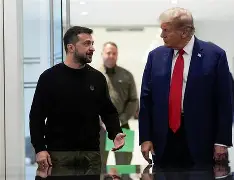Russia Complicating End to War, Zelensky Says as Trump Pursues Peace Deal
The Russia-Ukraine war continues to dominate global attention, shaping international politics, economic stability, and humanitarian efforts. As the conflict drags into its third year, Ukraine’s President Volodymyr Zelensky has accused Russia of deliberately complicating efforts to end the war, even as former U.S. President Donald Trump seeks to position himself as a potential broker of peace. The interplay of battlefield developments, diplomatic maneuvering, and political rhetoric in Washington, Kyiv, and Moscow underscores the complexity of any potential settlement.
In this analysis, we will examine Zelensky’s latest statements, Trump’s ambitions to negotiate peace, Moscow’s strategic calculations, and the wider implications for global geopolitics.
Zelensky’s Warning: Russia Blocking the Path to Peace

President Volodymyr Zelensky has repeatedly argued that Russia’s actions prove it is not serious about peace. Speaking during his latest briefing, he accused Moscow of staging deceptive maneuvers — both on the battlefield and at the negotiating table — to prolong the conflict and secure tactical advantages.
According to Zelensky, Russia continues to launch missile and drone attacks against Ukrainian cities, deliberately targeting infrastructure to sap the morale of civilians. Such actions, he argued, are inconsistent with genuine interest in peace. “You cannot speak of peace while at the same time destroying lives, homes, and energy systems,” he stated.
His words echo Ukraine’s longstanding position: a genuine settlement can only begin once Russia shows commitment to withdrawing its troops and respecting Ukraine’s sovereignty. However, Moscow has shown no such willingness. Instead, Russian officials have demanded recognition of their control over occupied territories, including Crimea and parts of Donetsk, Luhansk, Zaporizhzhia, and Kherson regions.
For Zelensky, agreeing to such terms would mean abandoning Ukraine’s territorial integrity — something he has vowed never to do.
Trump’s Bid for the Role of Peacemaker
Amid this tense stalemate, former U.S. President Donald Trump has re-entered the global spotlight with promises that he could end the war quickly if given the opportunity. Trump, who has consistently criticized President Joe Biden’s handling of the conflict, claims his personal negotiating skills and relationships with both Russian President Vladimir Putin and Ukrainian leadership would enable him to deliver a breakthrough.
Trump has suggested that he would pressure both sides into compromise. While he has not laid out detailed terms, he has hinted at a solution involving territorial concessions, security guarantees, and possible international oversight. His message resonates with a segment of the American public wary of continued U.S. financial and military support for Ukraine, particularly as domestic economic issues take precedence for many voters.
However, Trump’s approach is controversial. Many analysts fear that a deal brokered by him could favor Russia’s demands, particularly if it pressures Ukraine into giving up territory. Critics argue that such an outcome would reward aggression and undermine international law, setting a dangerous precedent for future conflicts.
Ukraine’s Concerns About Trump’s Peace Push
Kyiv has been cautious in its response to Trump’s peace overtures. Zelensky, while not directly dismissing Trump’s potential role, has stressed that any negotiation must respect Ukraine’s sovereignty and territorial integrity. In his latest remarks, he implied that Russia’s unwillingness to negotiate sincerely makes Trump’s promises unrealistic.
“Peace cannot be achieved by words alone. It requires Russia to stop aggression, withdraw troops, and respect international law,” Zelensky said.
Privately, some Ukrainian officials fear that Trump, if returned to office, might reduce U.S. support or force Kyiv into concessions. Such a scenario would drastically alter Ukraine’s strategic position and weaken its bargaining power.
Russia’s Perspective: Playing for Time
From Moscow’s perspective, prolonging the war may serve strategic purposes. Russian officials continue to insist that their military operations are justified by “security concerns” and the need to “protect Russian-speaking populations.” At the same time, they accuse Ukraine and the West of rejecting reasonable proposals.
Wearing Down Ukraine’s Resources – Prolonged conflict strains Ukraine’s economy, population, and military readiness.
Testing Western Unity – By extending the war, Moscow hopes to exploit divisions within NATO and the European Union, particularly over energy, sanctions, and aid.
Political Cycles Abroad – Russia knows that Western governments face domestic elections and changing priorities. Waiting out political transitions — such as the U.S. election — could shift the balance in Russia’s favor.
This calculation explains why Zelensky insists that Russia is deliberately complicating peace. Moscow’s demands are not designed to encourage compromise but to force Ukraine into submission.

The Global Dimension of Trump’s Peace Initiative
If Trump succeeds in positioning himself as a credible negotiator, the consequences would extend far beyond Ukraine. His return to the diplomatic stage would challenge the Biden administration’s current strategy, which emphasizes long-term support for Kyiv until Russia is forced to negotiate from a position of weakness.
European allies are also watching carefully. Many EU leaders remain skeptical of Trump’s approach, remembering his past criticisms of NATO and his praise of Putin. Some fear that a Trump-brokered peace would sacrifice European security for political convenience.
At the same time, there is recognition that Trump commands influence, particularly among U.S. voters tired of foreign entanglements. If he secures the presidency again, his vision for the conflict could redefine Western engagement in Eastern Europe.
The Stalemate on the Battlefield
Any discussion of peace must consider the realities on the ground.Ukraine has achieved some tactical gains with Western-supplied weapons, but Russian forces still control significant territory.
Both sides face challenges:
Ukraine is running low on ammunition and manpower, relying heavily on Western aid.
Russia has suffered heavy casualties but maintains numerical advantages and continues mobilizing resources.
The stalemate means neither side has enough leverage to dictate terms, making negotiations attractive in theory but elusive in practice.
Peace on Whose Terms?
The fundamental question is not whether peace is possible, but on whose terms it will be achieved.
Ukraine’s terms: full restoration of territorial integrity, accountability for war crimes, and binding security guarantees from the West.
Russia’s terms: recognition of annexed territories, neutrality for Ukraine, and lifting of Western sanctions.
Trump’s likely terms: a compromise somewhere between, potentially forcing Ukraine to accept territorial losses while granting Russia partial relief from sanctions.
These visions remain far apart. For Zelensky, anything less than full sovereignty risks undermining the sacrifices of millions of Ukrainians. For Putin, anything short of recognition of territorial gains risks appearing as defeat.
International Reactions to Zelensky and Trump
European Union
EU leaders broadly support Zelensky’s stance, emphasizing that peace must be just, not imposed. European Commission officials warn against “false peace” that legitimizes aggression.
NATO
The alliance remains committed to supporting Ukraine militarily. Secretary-General Jens Stoltenberg has argued that strong support is the surest path to eventual negotiations on fair terms.
China
Beijing has positioned itself as a potential mediator, though its neutrality is questioned given its close ties with Moscow. A Trump-led peace push could complicate China’s diplomatic ambitions.
Global South
Many countries in Africa, Asia, and Latin America prefer an immediate ceasefire to relieve economic pressure from high energy and food prices. They may welcome Trump’s efforts if it delivers stability, even at Ukraine’s expense.
Domestic U.S. Politics and the Peace Debate
Trump’s peace rhetoric also serves domestic political purposes. By criticizing Biden’s approach as costly and ineffective, he appeals to voters concerned about inflation, national debt, and military overstretch.
Biden, in turn, portrays himself as the defender of international order, arguing that supporting Ukraine is essential to preventing future aggression worldwide. The contrast sets up a sharp foreign policy debate in the 2024 election cycle, with Ukraine caught in the middle.
Humanitarian Costs: Why Zelensky Stresses Justice
Zelensky’s emphasis on Russia complicating peace is not just strategic; it reflects the enormous human suffering caused by the war. Millions of Ukrainians remain displaced, cities lie in ruins, and reports of atrocities continue to emerge from occupied areas.
For Ukraine, peace without justice — without accountability for war crimes, without return of displaced people, without reconstruction — is no peace at all. This explains Zelensky’s insistence that Russia’s current posture cannot be taken seriously.
What Comes Next?
The coming months will be decisive. Several factors will shape the future of peace efforts:
U.S. Election Campaign – Trump’s peace push will gain momentum if his political standing grows.
Battlefield Dynamics – Any breakthrough or collapse at the front could shift leverage.
Western Unity – Continued aid and sanctions will test the patience of European and American publics.
Russian Strategy – Whether Putin chooses escalation or limited concessions will define the negotiating space.
For now, Zelensky’s message is clear: Russia is complicating peace by refusing to act in good faith. Trump’s promises may sound appealing to some, but without changes in Moscow’s approach, the path to genuine peace remains blocked.
Conclusion
The Russia-Ukraine war stands at a crossroads, where battlefield realities, international politics, and domestic agendas intersect.
Yet the gap between competing visions of peace remains wide. For Ukraine, justice and sovereignty are non-negotiable.For Trump, political opportunity and the appeal of swift resolution define his approach.
Whether these conflicting interests can be reconciled remains uncertain. What is certain, however, is that millions of lives hang in the balance, and the choices made in Washington, Kyiv, and Moscow in the coming months will shape the future of Europe for decades to come.
http://Russia Ukraine war Trump peace deal Zelensky statement



